- Home
- Isaac Hooke
Rade's Fury (Argonauts Book 7)
Rade's Fury (Argonauts Book 7) Read online
BOOKS BY ISAAC HOOKE
Military Science Fiction
Argonauts
Bug Hunt
You Are Prey
Alien Empress
Quantum Predation
Robot Dust Bunnies
City of Phants
Rade’s Fury
Alien War Trilogy
Hoplite
Zeus
Titan
ATLAS Trilogy (published by 47North)
ATLAS
ATLAS 2
ATLAS 3
A Captain's Crucible
Flagship
Test of Mettle
Cradle of War
Planet Killer
Worlds at War
Science Fiction
The Forever Gate Series
The Dream
A Second Chance
The Mirror Breaks
They Have Wakened Death
I Have Seen Forever
Rebirth
Walls of Steel
The Pendulum Swings
The Last Stand
Thrillers
The Ethan Galaal Series
Clandestine
A Cold Day in Mosul
Terminal Phase
Visit IsaacHooke.com for more information.
RADE’S FURY
ARGONAUTS
BOOK SEVEN
Isaac Hooke
This is a work of fiction. All characters, names, organizations, places, events and incidents are the product of the author's imagination or used fictitiously.
Text copyright © Isaac Hooke 2017
All rights reserved.
No part of this publication may be copied, reproduced in any format, by any means, electronic or otherwise, without prior consent from the copyright owner and publisher of this book.
www.IsaacHooke.com
Cover design by Isaac Hooke
Cover image by Shookooboo
Special thanks to the following Beta Readers who helped out with this book:
Nicole P.
Gary F.
Sandy G.
Lance W.
Amy B.
Myles C.
Lisa A. G.
Gregg C.
Jeff K.
Mark C.
Mark P.
Jeremy G.
Doug B.
Jenny O.
Gene A.
Larry J.
Allen M.
Norman H.
Robine
Eric
And thank you to the following Special Consultants:
Martin P.
Don M.
table of contents
one
two
three
four
five
six
seven
eight
nine
ten
eleven
twelve
thirteen
fourteen
fifteen
sixteen
seventeen
eighteen
nineteen
twenty
twenty-one
twenty-two
twenty-three
twenty-four
twenty-five
twenty-six
twenty-seven
twenty-eight
twenty-nine
thirty
thirty-one
postscript
about the author
acknowledgments
one
The dark ship drifted through the main belt of the asteroids. Despite the numerous sensors and beacons placed throughout the system, that insidious craft proceeded undetected toward the planet of its conquerors, slipping right through the defense lines. All the science and technology the former conquerors had couldn’t protect them from what was coming.
The vessel occasionally launched small pods when it neared the outposts and stations in that system, and where those capsules touched, dark veins spread outward across the metal of said structures, converting them to the ship’s control.
The craft continued its advance unnoticed for the next three days until it reached the object of its wrath, a blue and white planet orbited by an atmosphereless moon. The dark vessel initiated a series of cascading operations meant to isolate the planet from the rest of the galaxy, clearing the way for the ship and the Sentience that occupied it to begin the systematic defeat of their former conquerors.
Through the white clouds that sheathed the quaint planet, in an out of the way corner of a country famous for wine production, a man labored in the fields alongside robot workers. He, like most civilians, had no idea what was taking place in orbit above.
Some of the machines with him were humanoid. Many were former combat robots, temporarily repurposed to function as pickers. Like him, they tenderly separated grapes from vines and placed them in large wicker baskets.
Those robots were an interesting bunch: all of the original workers had been freed when the Franco-Italian AI Anti-Slavery Act went into effect, but most had chosen to stay, participating in the profit-sharing the owners had offered them. It was doubtful they had stayed simply for the money—most likely it was because they had known no better life. The man had stayed in the military for as long as he did for similar reasons.
Sure, a few of the robots had gone off to explore the world, but had come back when they saw how most humans viewed robots. Attitudes had improved over the past fifty years, but a robot still faced a harsh life out there. The Franco-Italians were one of the few to pass that act. Robots could still be bought and owned in other parts of the world and galaxy—including the United Systems. If such a law were passed universally, people would lose ownership of sentient AIs across the galaxy, including starships. Unless the AIs chose to stay, like these robots had.
The other farming robots were out in full force. The gatherers, whose multiple arms and central vats were designed to rapidly pick grapes. The airborne drones, retrofitted with downward-hanging collectors so that they looked like floating octopuses held aloft by four buzzing rotors. None of these latter farming robots were fully sentient, and thus didn’t qualify as AIs under the act—autonomous was a better description of them.
Ordinarily, only the gatherers would be out there amid the vines, but the harvest was late this year, and the machines joined forces to pick as many of the grapes as possible before the first frosts.
Rade didn’t really have to be out there, as his slow human hands wouldn’t make all that much difference to the overall collection, but he did it as a show of solidarity for the robot workers. He never ordered a crew member to do something he himself wouldn’t do, and he wanted to show that to the robots. It was part of his leadership style, even if he wasn’t directly in charge at the moment.
Rade paused as the stem he was concentrating on bobbed uncontrollably in a rising breeze. He glanced up as the wind gusted harder, and he searched the horizon, but there was no sign of any storm clouds.
The gust died down and he returned to picking. Shaw had only just gone inside, having retired for the day.
He smiled, thinking about her living the life of a vintner. Rade had tried to sell Shaw and her parents on an assembly line farming system, which involved each vine growing in a self-contained, mobile unit: essentially potted plants on tracks. When the time came to harvest, the individual units were hoisted, conveyor-belt style, inside a central processing facility and systematically plucked of grapes. The conveyor system also made it easy to prune the vines during the growing season, and to treat them for any insect infestations.
But Shaw rejected the very idea of an assembly line. She wanted to keep the growing process as natural as possible. Shifting t
he position of the plants during the growing process would influence the “character” of the wine, she claimed, and negatively impact the taste. The cost of such a system was also prohibitive: even if she sold all her farming robots, she would only recover enough to pay for a third of the assembly line installation. And of course, her parents would never approve. Though Shaw had a majority stake, she ceded to the will of her parents in all estate matters.
Rade thought of the road that had led him to this moment. Surus was still his main client; two years had passed without further signs of Phant presence in human space. In the last operation, the team had captured hundreds of them, and then trapped the entities in the core of a star. Rade was beginning to think there were no more Phants left in this region of space. The mission was probably close to being done. Then again, Surus had lost many of her eyes and ears after her falling out with the other Greens, and even though she had trained new ones from the robots and humans among her contacts, none of them were as good as the Greens had been at ferreting out other Phants.
Since they had seen such little action, Surus had allowed Rade and his team an extended liberty. A paid liberty, at that. Rade had chosen to take it on Earth. The alien herself had gone away for six months to set up a new base of operations, but didn’t tell Rade where the base was. She had taken the Acceptor with her, a teleportation device capable of sending robots and organic life to matching units distributed throughout the galaxy. She had also transported several other artifacts and a couple of alien bodies formerly stowed aboard the Argonaut to her new base. Noctua, her robot owl personal assistant, had gone with her as well.
Surus had recently returned to Earth without the owl, and the last time she had spoken with Rade, she was in the heart of China. Rade had asked if she had any upcoming missions for the team, and the answer was: very soon. That was two months ago.
While Rade and Shaw had gone to her vineyard in France, the rest of the team had originally split up, some of them going to United Systems territories in North America, others dispersing throughout Western and Eastern Europe. Of late the rest of the team had gathered upon the French Riveria, apparently unable to stay apart from one another for overlong.
Most of the team members had local girlfriends, save for Bender and Manic, who, when they weren’t in the gym, spent their days on the beaches. Under the pretext that they were surfers, they walked up and down the beaches with surfboards, chatting up the finest specimens of the female species that caught their eyes. They never did any actual surfing, of course—the swells in that area weren’t very well suited for it. But they claimed their board routine allowed them to secure ten to twenty IDs a day, and at least one date per night. Whenever Rade saw them, they always had a new girl hanging from their arms, so it must have been working. Even Harlequin had gotten himself a human girlfriend of late, which Rade found surprising, as he thought the Artificial would have preferred one of its own. But who was he to judge what company a sentient being chose for itself?
The team had pooled their money to rent out a large villa on the beach, and they lived in the shared accommodations with their girlfriends. Well, everyone except Tahoe, who had shipped his wife and family over—he rented out a much smaller villa close by. When he had first arrived, Tahoe and his family had stayed in the vineyard’s guesthouse, but Rade had sent his family packing when Tahoe insisted on helping out with farming duties. Rade wanted his friend to enjoy his liberty, not work through it.
Rade visited the team on weekends, as the vineyard was only a short drive away. He would have flown, but personal aircraft were restricted in the region; Shaw didn’t own any drones capable of transporting humans anyway.
The men were based near Saint Tropez on the Côte d’Azur. When Rade arrived on weekends, he often had to bail one or another of the Argonauts out of jail for disorderly conduct. Bender and Manic were the usual suspects, though lately Lui, TJ, and even Tahoe had spent time behind bars. It was worrying. Rade knew he had to get them a mission soon before the team became too restless.
As he picked grapes, Rade’s mind continued to wander. He thought of Shaw’s parents, who were currently on vacation in Marseille. It was just like them to take a vacation when the harvest was late. They were very hands off, and in fact had ceased most involvement with the day-to-day operations of the estate years ago. He remembered Shaw’s father saying something along the lines of: “What’s the point of having a passive income stream if it isn’t truly passive!”
Her parents owned about forty-percent of the vineyard: they had gifted Shaw the remainder. That was before Rade had started his security consulting business, when they thought Shaw was going to take over the family estate. They were probably more than a bit disappointed when she had packed up and left Earth to roam the galaxy with her ex-MOTH boyfriend. Though they seemed happy when Shaw finally returned with a baby under each arm.
Because of the rejuvenation treatments, neither parent appeared older than Rade or Shaw. In fact they seemed younger, looking like two college sweethearts fresh out of university.
When he first saw them, Rade told Shaw: “Promise me you and I will never overdo our treatments like that.”
Shaw nodded. “It’s very strange to have parents who appear younger than you do. Though it’s also comforting, in a way. It makes me feel like they’ll be here for me forever.”
Rade had allowed his Marauder class starship, the Argonaut, to take a liberty of its own: he had booked the starship in an extended storage facility in high Earth orbit. Bax, the ship’s AI, had linked into Cradle Online, a shared virtual environment utilized not only by the AIs of other starships in the dock, but robots planet-wide. It was essentially a massively multiplayer online role playing game designed by AIs for AIs. While humans could log into the environment as well, the game world mechanics were nonsensical to them. Rade had once tried it himself, and found himself floating disembodied in a world of giant molecules, where the only means of transportation was the excitation of electrons around protons, and by hitching a ride onto the resultant photon that was produced. Very weird.
He popped a grape into his mouth, and glanced at the blue sky. He felt the heat of the sun on his face. The whir of servomotors competed with a band of nearby robins to fill the soundscape. The grape was ripe, sweet.
Ah France, I’ve missed you.
Sometimes he wondered why he had joined the military, and the irony of it all wasn’t lost on him. He had joined and fought so very hard mostly to gain citizenship in the United Systems, and now that he had it, he didn’t even bother to live there, or to utilize all the benefits that came with said citizenship. Yes, he sometimes wondered why he had crossed that border and enlisted in the first place.
But then he had to remind himself: if he hadn’t, he would have never met Shaw. Nor the other warriors who had become his closest friends. He would not be the man he was today.
The wind picked up once again, more violently than before. Frowning, Rade glanced at the horizon. Annoyance quickly gave way to concern. In the distance, he saw a fast approaching storm front.
It had formed far too fast to have developed naturally.
two
Rade hadn’t noticed any storms scheduled for that day on the InterGalNet. It was possible a forest fire had broken out somewhere, and the weather satellites had seeded the storm as part of the preparatory measures to calm the conflagration before the autonomous fire fighting units arrived.
He quickly checked the weather widget via his Implant. There were no notices. Not even a storm warning.
Well, that’s odd.
Climate control would prevent the storm from getting too bad, of course. But the robots couldn’t work if the rain became too heavy, nor if the wind continued to gust so hard. And although he hadn’t seen any signs of lightning, that was another reason to bring the robots in during a storm.
“All right, you stinkin’ farm animals,” Rade sent over the adhoc network formed between his Implant and the comm nodes of the nearby
robots. “Storm’s coming. Deposit your latest batches in the winery and then shack up! Algorithm, make a quick run of the field to ensure none of the robots are left behind.” It was possible one of the robots might be toiling beyond the range of the adhoc network, since Rade hadn’t gotten around to installing boosters on the site.
“Yes, boss,” the aforementioned Centurion replied. Algorithm, like most of the combat robots, was accustomed to life aboard the Argonaut, but it had adapted quickly to the demands of the estate. Its humanoid body was composed of military-grade polycarbonate, its arms and legs blocky tubes with round servomotors at the joints. The box-shaped head was featureless, covered by a smooth polycarbonate plate in front.
“George, we got a storm,” Rade transmitted.
George Stanley was the caretaker, an Artificial who had been with the family for fifty years. He resided in the caretaker’s apartment on the estate.
“I see it,” George replied over the comm.
“Rade, better wrap up out there,” Shaw sent over the same network.
“I’m wrapping up, don’t you worry,” Rade replied.
He remotely accessed the doors of the winery and Quonset, and opened both of them. The autonomous drones and gatherers swooped inside the former, depositing their grape baskets, and then made their way to the Quonset. The rotors of the drones buzzed loudly in complaint as the machines fought the strong wind. When the last of them were inside, Rade locked the latter building.
The humanoid robots—Rade’s own Centurions, along with the vineyard units they worked with—similarly dumped their grapes into the winery, then hurried to the two story building adjacent to the caretaker’s apartment. That building was reserved for robot workers. Two hundred years ago it had been used to board temporary migrants, but since robots had obsoleted such workers, the building was reserved exclusively for the humanoid machines that had become permanent fixtures on the estate over the years.

 Warden 2
Warden 2 Devastator
Devastator Warden 4
Warden 4 Emperor
Emperor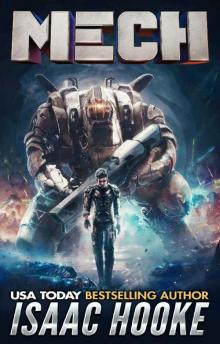 Mech
Mech Conqueror
Conqueror Fighter
Fighter The Forever Gate Ultimate Edition
The Forever Gate Ultimate Edition Defiler
Defiler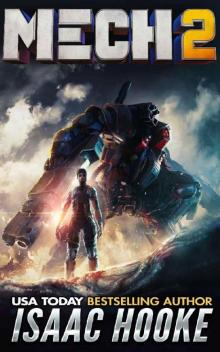 Mech 2
Mech 2 Warden 3
Warden 3 Warden 1
Warden 1 Mech 3
Mech 3 Forerunner
Forerunner The Alliance (AI Empire Book 2)
The Alliance (AI Empire Book 2) Breaker (Monster Tamer Book 1)
Breaker (Monster Tamer Book 1) Bender of Worlds
Bender of Worlds The Pendulum Swings (The Forever Gate Book 8)
The Pendulum Swings (The Forever Gate Book 8) The Link
The Link Just Another Day
Just Another Day Star Warrior
Star Warrior Alien War Trilogy 1: Hoplite
Alien War Trilogy 1: Hoplite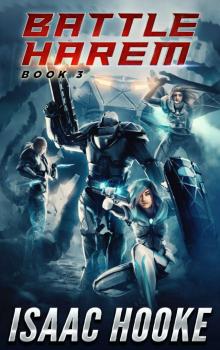 Battle Harem 3
Battle Harem 3 The Ethan Galaal Series: Books 1 - 3
The Ethan Galaal Series: Books 1 - 3 Reloaded
Reloaded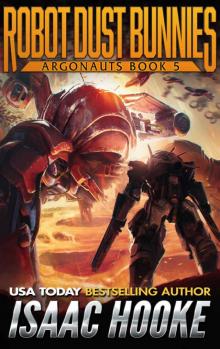 Robot Dust Bunnies (Argonauts Book 5)
Robot Dust Bunnies (Argonauts Book 5) Battle Harem
Battle Harem ATLAS 3 (ATLAS Series Book 3)
ATLAS 3 (ATLAS Series Book 3) Argonauts 2: You Are Prey
Argonauts 2: You Are Prey Worlds at War (A Captain's Crucible Book 5)
Worlds at War (A Captain's Crucible Book 5)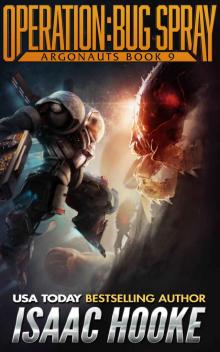 Operation: Bug Spray (Argonauts Book 9)
Operation: Bug Spray (Argonauts Book 9) Battle Harem 2
Battle Harem 2 Redeemed (Bolt Eaters Trilogy Book 3)
Redeemed (Bolt Eaters Trilogy Book 3)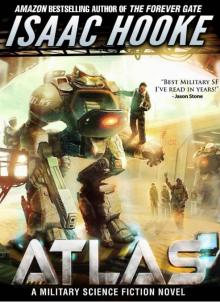 Atlas
Atlas Argonauts 1: Bug Hunt
Argonauts 1: Bug Hunt Reactivated (Bolt Eaters Trilogy Book 1)
Reactivated (Bolt Eaters Trilogy Book 1) Alien War Trilogy 3: Titan
Alien War Trilogy 3: Titan Flagship (A Captain's Crucible #1)
Flagship (A Captain's Crucible #1)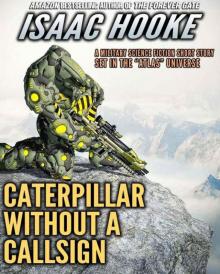 Caterpillar Without A Callsign
Caterpillar Without A Callsign The Forever Gate
The Forever Gate He Who Crosses Death (Star Warrior Quadrilogy Book 3)
He Who Crosses Death (Star Warrior Quadrilogy Book 3) Reforged (Bolt Eaters Trilogy Book 2)
Reforged (Bolt Eaters Trilogy Book 2)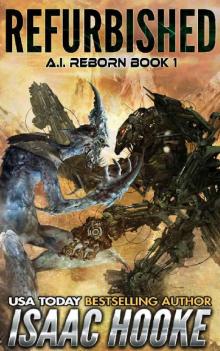 Refurbished
Refurbished Reloaded (AI Reborn Trilogy Book 2)
Reloaded (AI Reborn Trilogy Book 2) He Who Crosses Death
He Who Crosses Death Explorations: First Contact
Explorations: First Contact Planet Killer (A Captain's Crucible Book 4)
Planet Killer (A Captain's Crucible Book 4) Quantum Predation (Argonauts Book 4)
Quantum Predation (Argonauts Book 4) Clandestine-IsaacHooke-FreeFollowup
Clandestine-IsaacHooke-FreeFollowup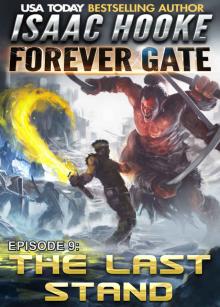 The Last Stand (The Forever Gate Book 9)
The Last Stand (The Forever Gate Book 9) City of Phants (Argonauts Book 6)
City of Phants (Argonauts Book 6) Test of Mettle (A Captain's Crucible Book 2)
Test of Mettle (A Captain's Crucible Book 2) Cradle of War (A Captain's Crucible Book 3)
Cradle of War (A Captain's Crucible Book 3) Rade's Fury (Argonauts Book 7)
Rade's Fury (Argonauts Book 7) Rebirth (The Forever Gate Book 6)
Rebirth (The Forever Gate Book 6) The Forever Gate Compendium Edition
The Forever Gate Compendium Edition Mechs vs. Dinosaurs (Argonauts Book 8)
Mechs vs. Dinosaurs (Argonauts Book 8) Alien War Trilogy 2: Zeus
Alien War Trilogy 2: Zeus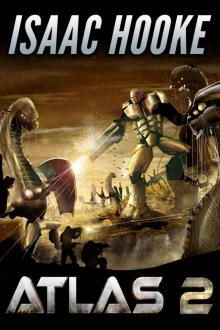 ATLAS 2 (ATLAS Series Book 2)
ATLAS 2 (ATLAS Series Book 2) Operation_Bug Spray
Operation_Bug Spray